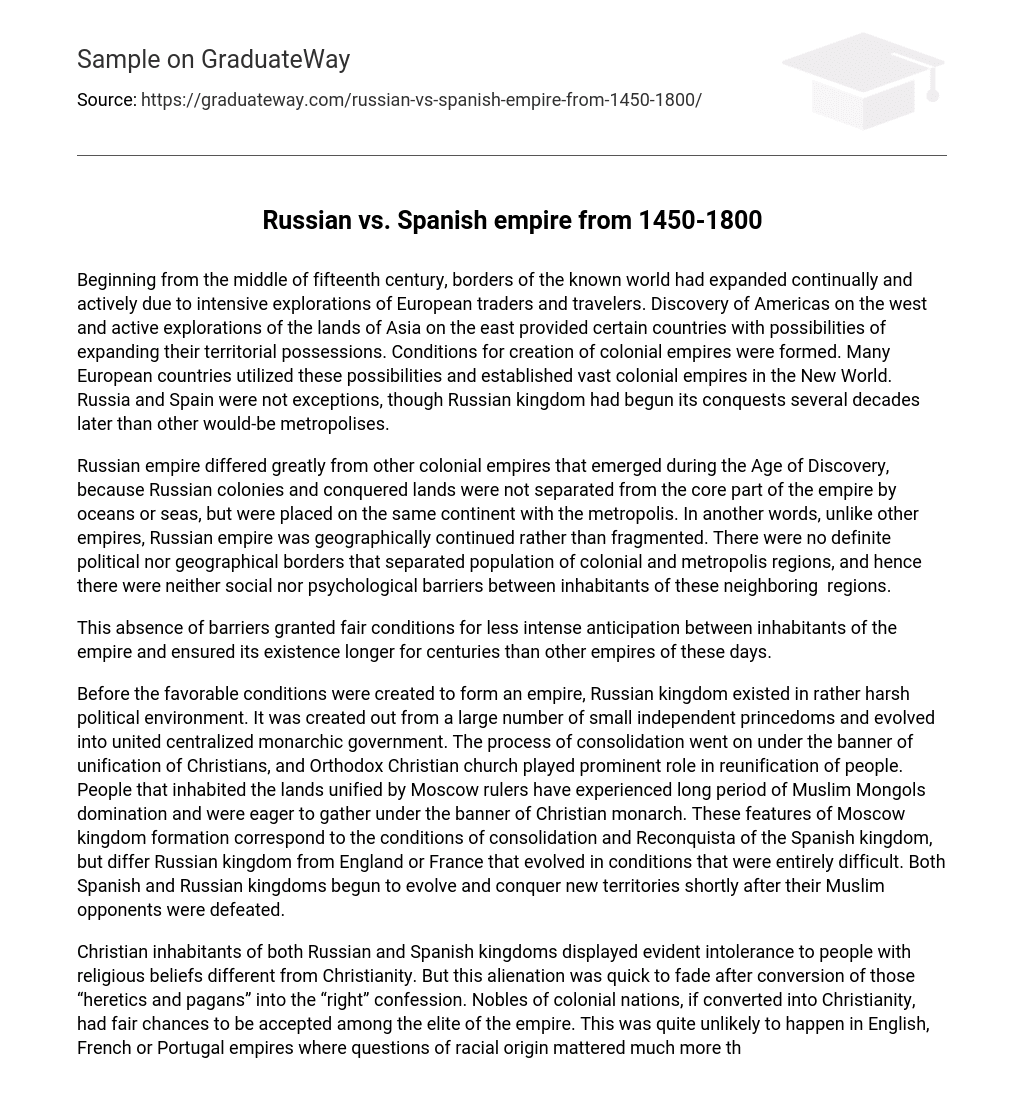Beginning from the middle of fifteenth century, borders of the known world had expanded continually and actively due to intensive explorations of European traders and travelers. Discovery of Americas on the west and active explorations of the lands of Asia on the east provided certain countries with possibilities of expanding their territorial possessions. Conditions for creation of colonial empires were formed. Many European countries utilized these possibilities and established vast colonial empires in the New World. Russia and Spain were not exceptions, though Russian kingdom had begun its conquests several decades later than other would-be metropolises.
Russian empire differed greatly from other colonial empires that emerged during the Age of Discovery, because Russian colonies and conquered lands were not separated from the core part of the empire by oceans or seas, but were placed on the same continent with the metropolis. In another words, unlike other empires, Russian empire was geographically continued rather than fragmented. There were no definite political nor geographical borders that separated population of colonial and metropolis regions, and hence there were neither social nor psychological barriers between inhabitants of these neighboring regions.
This absence of barriers granted fair conditions for less intense anticipation between inhabitants of the empire and ensured its existence longer for centuries than other empires of these days.
Before the favorable conditions were created to form an empire, Russian kingdom existed in rather harsh political environment. It was created out from a large number of small independent princedoms and evolved into united centralized monarchic government. The process of consolidation went on under the banner of unification of Christians, and Orthodox Christian church played prominent role in reunification of people. People that inhabited the lands unified by Moscow rulers have experienced long period of Muslim Mongols domination and were eager to gather under the banner of Christian monarch. These features of Moscow kingdom formation correspond to the conditions of consolidation and Reconquista of the Spanish kingdom, but differ Russian kingdom from England or France that evolved in conditions that were entirely difficult. Both Spanish and Russian kingdoms begun to evolve and conquer new territories shortly after their Muslim opponents were defeated.
Christian inhabitants of both Russian and Spanish kingdoms displayed evident intolerance to people with religious beliefs different from Christianity. But this alienation was quick to fade after conversion of those “heretics and pagans” into the “right” confession. Nobles of colonial nations, if converted into Christianity, had fair chances to be accepted among the elite of the empire. This was quite unlikely to happen in English, French or Portugal empires where questions of racial origin mattered much more than nobility and influence of aborigine.
There is also certain similarity in population structure of lands conquered by Russian and Spanish empires. There were regions with dense Christian population and regions populated mainly by Muslims, provinces with mixed population with different economic needs and religious views that traditionally lived side by side for generations, and territories inhabited by primitive, undeveloped people with animistic religious beliefs that could be easily converted and educated. These population structure similarities generated relatively similar problems to solve: in Christian-populated conquered lands there were separatist moods and unshakable resistance to assimilation. In Muslim territories problems of integration into culturally different society were of great importance. Regions with mixed population, however, were quite friendly in general because external rulers granted them peace and significant cultural advancement. Undeveloped people had to be educated and assimilated, but this could be achieved with relative ease by introduction of enclaves of settlers from the metropolis who did the job of assimilation rather well.
Despite listed similarities, geographic continuality of Russian Empire played its important role, and, while Spanish colonies were separated from the metropolis at last, Russian government still retains possessions conquered centuries ago.





